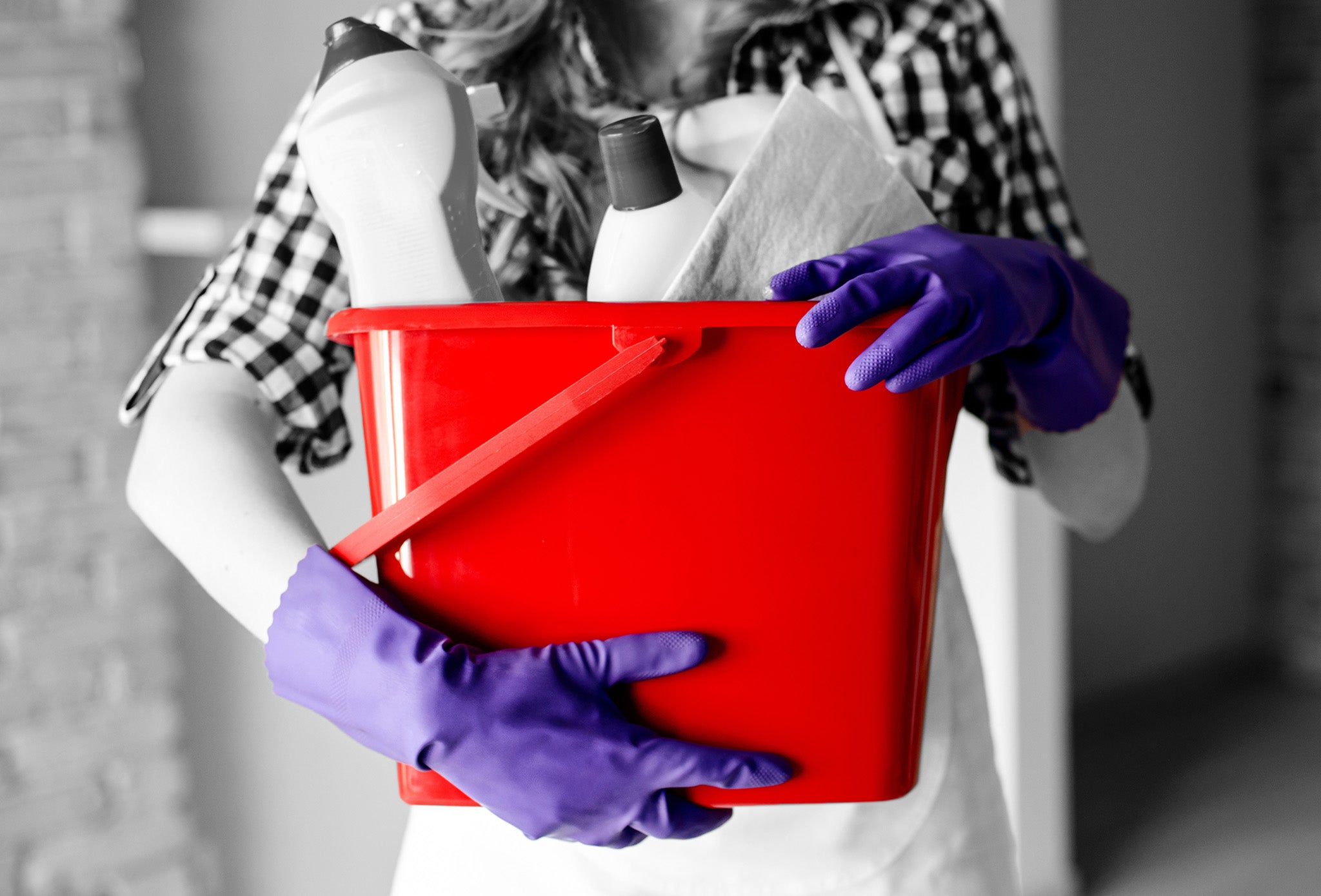Dishing the dirt: What do cleaners really think about their employers?
They are members of an invisible army and bring order to our lives – but what do they have to tolerate in the process? In this extract from his latest book, Nick Duerden looks at the women behind the mop and bucket


It was as if she were invisible, like she wasn’t even there. Or, perhaps more accurately, like she didn’t really count, not in any tangible sense, this mostly silent domestic cleaner with the broken English whose back was perpetually stooped over the vacuum cleaner, the dustpan and brush, the damp mop; someone who likely knew her way around the utility room better than the homeowners themselves.
Today, the wife was away on business, as she frequently was, but the husband wasn’t here alone. The marital bed was not empty.
“A different woman,” she says. “Younger.”
And he didn’t hide this from you, wasn’t embarrassed, ashamed of parading his affair so brazenly under your nose?
She shakes her head, and smiles tightly. “No,” she says. “No.”
She was seemingly in his confidence, then, but not through any prior agreement, a finger to the side of the nose, and nor was he paying her for her silence, her implicit complicity. “I don’t think he even considered me,” she says. “Or my reaction.” She was merely part of the furniture, a once-weekly presence in the house who mutely got on with her work as she always did, over three floors, three bedrooms and two bathrooms: the vacuuming, the polishing, the dusting.
She had a name, Boglárka, and she was Hungarian, mid-thirties, here in London a couple of years now, almost fluent but shy with it. She had a bank account, a bike, an Oyster card; she flat-shared in one of the outer boroughs, and diligently sent money back home each month via PayPal. The wife knew her name, though, would, like everyone else here, struggle with its hard consonants, but the husband offered no suggestion that he did. “Hello” and “goodbye” had been the full extent of their communications since her work here had begun a full year previously.
Right now, she picked up the clothes that had been discarded, pre-coitally the night before, on the bedroom carpet, disposed of the used prophylactic, and focused on the post-coital bed once she – the other woman – had at last got up to join the husband downstairs in the kitchen. More traces of the previous night’s indiscretion were then dutifully wiped clean, the bed stripped, the sheets bundled into the washing machine, which she set to 60° before pressing START.
She cleaned the en-suite, the shower stall and scrubbed the toilet bowl, which bore evidence of repeated use and little care and attention on the days she didn’t come to clean
She cleaned the en-suite, the shower stall, and scrubbed the toilet bowl, which bore evidence of repeated use and little care and attention on the days she didn’t come to clean. She hung his crumpled suit jacket back in the wardrobe, and liberated the clothes dryer of its smalls, his and his absent wife’s, replacing them gently, respectfully even, in their appropriate drawers, his and hers, on either side of the matrimonial bed. The photograph of the both of them on their wedding day, confetti in their hair, sat in its usual position on the chest of drawers. She dusted it now, as she always did.
Working from the top of the house to the bottom, opening windows under the eaves in the attic and disturbing the dust, which took to the air and danced in a column of sunlight, she used Cif and Harpic, Domestos and Windolene, her rubber gloves slick with chemicals, her fingers inside clammy with sweat. Often, she was down on her hands and knees, because he liked the carpet beneath the bed swept, the floorboards underneath the sofa, too. Here, she found balls of fluff, probably the cat’s, and curling sweet wrappers; she found odd socks, a random shoe whose low-heeled counterpart, she presumed, was secreted elsewhere in the house but not yet stumbled across. A bra: the wife’s, or the other woman’s?

If the bathroom had been reliably messy, the kitchen was worse. The kitchen was always worse. Woks and frying pans meant grease splattered north, east, south and west, the cupboards alongside the hob, the dust-encrusted extractor fan above. Mr Muscle Kitchen Cleaner, and lots of it. Plates were piled high in the sink, mugs with days-old tidemarks. A scouring pad somewhere beneath.
Next to the microwave, the coffee that he had made for her, that he made for her every Wednesday morning at 8 o’clock, was cooling, first ignored, then ultimately forgotten, coffee that she would, after he had departed for work, pour slowly down the sink in favour of the tall glass of water she needed to slake her mounting thirst.
She found balls of fluff, odd socks, a random shoe whose low-heeled counterpart, she presumed, was secreted elsewhere in the house but not yet stumbled across. A bra: the wife’s, or the other woman’s?
She steered clear of the kitchen for now, taking her time in the living room, with its bookshelves, mantelpiece trinkets, the multiple picture frames, the Venetian blinds. She loitered here longer because they were still at the kitchen table, sharing a leisurely breakfast, her legs draped proprietorially over his.
He had made her something complicated with eggs (his usual breakfast was a banana and slice of toast), and both of them would be late for work. From where she was in the lounge, deliberately not eavesdropping but overhearing everything anyway, she could make out kisses, lovers’ giggles. She coughed loudly, deliberately. The ruse worked. The man looked over at the wall clock, noting the time. Shoes on, jackets, briefcase and handbag. Car keys. The front door opened, then slammed shut. Gone, leaving nothing but trails of aftershave and perfume in their wake.
She would likely never see this woman again, and next Wednesday the wife would be back in place, this woman to whom Boglárka would have to smile in greeting while maintaining an awkward silence, siding with the husband when, had she been given the choice, she’d much rather have sympathised with the wife. But this was a line she was unable to cross, the ghost in the house who saw no evil, nor spoke it. Her presence in this soap opera might have been front row, but it was not her place to applaud or jeer.
But then, as she had long ago learned, this was an unwritten part of her job description. A domestic cleaner sees many things on any given day during the cleaning of houses; she tells no one. Or almost no one. She tells her fellow cleaners. Cleaners have much gossip to share. And so while she sees everything, and sometimes bears the brunt of her employers’ casual cruelties, she keeps shtum. She simply gets on with the task at hand, because there is always more work to do. Dirt has a habit of reproducing.
Boglárka has also learned that while she would prefer to have a full grasp of English, some employers would like her tongue to remain semi-skilled
Boglárka has also learned that while she would prefer to have a full grasp of English, some employers would like her tongue to remain semi-skilled. When one is not fluent in the language of the host country, her flatmates have explained, a barrier remains between employer and employee – a notable distance. The hierarchy is observed. Non-linguists can feel inhibited in such situations, so perhaps this is one reason why so many are employed in London today.
Homeowners like the conviction that they are above, and cleaners below. The less likely cleaners are to answer back, the more the social order is maintained. In this way, our domestic help will keep themselves to themselves, and focus solely, and silently, on the task at hand. In this way, each can ignore the other’s existence more easily, if not entirely, the physical presence of either party receding into a fuzzy background.
But our cleaners do take notice. Naturally and reflexively, they are cultural anthropologists. They hold the key to our real identities, to the people we really are, behind closed doors.

Domestic help was once a comparative rarity in the UK, the preserve of the upper classes, those who lived upstairs and employed those who dwelt downstairs. By the early 1900s, the middle classes had begun to enjoy the benefits of cleaners, too, not merely because they also craved tidy homes that they did not have to toil over, but because employing domestic staff had become an indicator of status. The average cleaning lady was a cleaning girl, still a teenager and likely uneducated, and therefore eminently affordable. They were second-class citizens working as slave labour, but without them residences would fall into abject disarray.
After World War Two, and the introduction of the welfare state in 1948, money was scarce and demand for cleaners evaporated. Throughout the 1950s and beyond, they became, once again, largely the preserve of the wealthy.
But the 1980s saw another shift. Husbands and wives were now required to go out to work, to pursue careers. This left little time for domestic upkeep, and if wives were too tired to vacuum after a long day at the office, their husbands were unlikely to step into the breach. Two salaries brought financial security, and so once again we looked to others to clean up after us. The gig economy duly materialised, and previously out-of-work women began to advertise themselves as cleaners. They brought their friends with them, their mothers and daughters. There was no shortage of willing char ladies.
A generation on, cleaners began utilising the internet. Now anyone can find one at the click of a mouse, and many of us have done just that. Type ‘cleaners London’ into a search engine, and over 39 million results come up.
The 21st century has seen further change to how we manage our daily lives. Increasingly, we are willing to delegate more, specifically to pay others to do the work we’d rather not do ourselves, even if we cannot really afford it. A wave of cheap immigrant labour entered the UK between 2000 and 2020, especially from the new EU member states in eastern Europe. Better to pay a Magda from Poland, say, £30 a week to run the Hoover around the house for a few hours than to save the money for a rainy day. Careers can be made in cleaning now, and entrepreneurial types have rushed to set up their own businesses in what has become a booming market.
The younger generation has grown up learning that cleaning is something one simply doesn’t do for oneself. Others can do that kind of thing for you
One in four households with an annual income of under £20,000 still finds the money to pay for a cleaner. Nationwide, the industry is worth £26 billion a year. Research commissioned by the insurance company esure suggests the under 35s are most likely to have a cleaner on a weekly basis, millennials intent on getting the most out of their downtime in a way that their parents never did, and never could. If there used to be a certain stigma, a lingering sense of class guilt, about employing another human being to tidy up after you when you could tidy up yourself, there isn’t any more. The younger generation has grown up learning that cleaning is something one simply doesn’t do for oneself. Others can do that kind of thing for you.
We might still feel secretly awkward about this. In the words of the writer and poet Kate Clanchy, who wrote a book, Antigona and Me, in 2009 about the improbable relationship she had with her own cleaner, a refugee from Kosovo: “It’s about class, and oppression. Even if you think of yourself as this nice, liberal person, you are still representative of the leading class, especially to those you employ. The truth is, every white person in this country is sustained by three or four brown people, and that can be embarrassing to us for all sorts of reasons.”
£26bn
is the value of the cleaning industry each year
If it is increasingly true that more and more of our cleaners are coming from overseas. Those who come from Poland, from Bulgaria and Romania, from the Philippines and Indonesia, tend often to be university educated. Back home, they were white-collar professionals. But they were forced to leave their countries because they could no longer afford to live on the wages they earned, even in decent jobs. Inflation was crippling. So they left their breaking, and broken, countries, and travelled abroad in pursuit of that most covetable of things: a living wage. They came to the UK, and they came to London, where the capital is full of domiciles that need cleaning, and owners impatient to employ someone to oversee the whole messy business. Many such homeowners found themselves more comfortable taking on someone from Romania than from Romford.
“If you employ a British person to clean your house, they are likely to be working class,” says one cleaner-turned-businesswoman from Bulgaria’s capital, Sofia. “Many have studied, just like you have, to get a British education, but unlike you, they still end up a cleaner, and this is for them a low status job. So they might resent you. And you, the employer, might see this resentment, and feel it. It’s a class issue. But if you employ someone from overseas, someone like me, then you have an educated person cleaning your house, middle-class just like you. So they are the same as you, you might say. With an English cleaner, perhaps not so much. That’s the difference. And it’s a big difference."
But who are the members of these well-drilled regiments? What are their stories? Do they know that we talk about them? And how much do we care that they talk about us? If we are the prism through which they view their host nation, what conclusions do they draw? Do we make for decent employers, fair and kind, perhaps even generous? And if we are sometimes cruel, and talk down at them, why do we do that? Do we treat them fairly – or are they being taken advantage of?
If we asked them, what would they say?
You can buy ‘Dishing the Dirt’ by Nick Duerden here – Independent readers get 10 per cent off the book by entering the code INDY10 at checkout.




Join our commenting forum
Join thought-provoking conversations, follow other Independent readers and see their replies
Comments